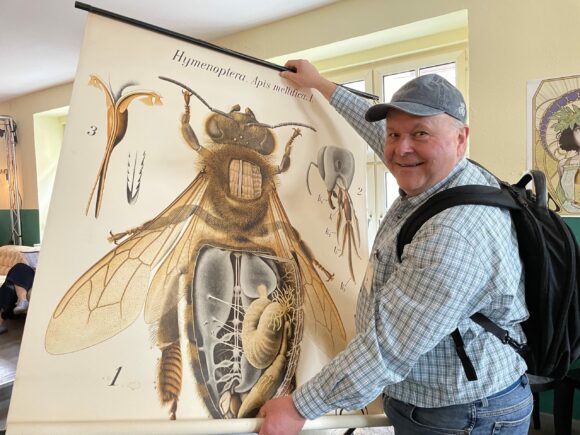For some it is simply prostitution, for others just a special form of relationship between old and young: In the study program Economic and Organizational Sociology, the relationships between older, mostly wealthy men and their favored partners are now also the subject of research. Reason enough to talk to course director Prof. Dr. Carsten Stark. In addition to his work at Hof University, he is also chairman of the Professional Association of German Sociologists.

Prof. Stark, what – exactly – is a “sugar daddy”? Is there a universally valid definition?
“No, there isn’t. There are no generally valid definitions for such social phenomena, but rather relatively accurate descriptions: In principle, it refers to men who enter into a longer-term sexual relationship with a considerably younger person (“sugar babe”) and pay that person a kind of pocket money in return. The age difference is usually so great that the men involved could be the fathers of the sexual partners – hence “sugar daddy”. The monthly pocket money ranges between 500 and 1000 euros, in rare cases even more. In addition, on the “cost side” for the daddy, there are expenses such as hotel accommodations, travel expenses, restaurant bills, etc…
Interestingly, we have not yet come across a “Sugar Mother” in our research. Meanwhile, the Sugar Babes are literally of all genders. So we can confidently say that here, old men are looking for just about anything they’d like to have sex with on a regular basis.”
Well, that’s certainly not such a common field of research in sociology either. How did you just come across this topic and how did your students react?
“I have to backtrack a bit on that: The beauty of sociology is that there are more topics than there are sociologists. But you notice this so little in the research landscape, because university colleagues have to chase after third-party funding like maniacs, and this creates a mainstream from which the same “results” are cobbled out again and again.

Fortunately, that is not the case here, so that at the university I (still) enjoy, in principle, the freedoms in research that at the universities are only used as an ideological template for generating third-party funding. This allows me to work on topics that are researched only very inadequately or not at all at universities. And that’s where I’m at in a lot of fields…”
That’s gratifying and exciting at the same time…
“Yes. I have been interested in the Internet and its effects on interaction and communication ever since this communication medium has existed. Currently, I have written a book on the connection between social media and social differentiation phenomena (“Nations Divided,” 2019) and, together with colleague Wagener, I have published a book on the effects of the digitalization of politics on democracy (“The Digitalization of the Political,” 2023). Relating the theme of digital communication and social media to areas such as friendship, sexuality, and prostitution is an obvious one. In fact, the last theme also comes from my work for the criminal police in NRW.
My students take up such topics enthusiastically, and I enjoy working with them on such topics immensely. I take a Chicago School approach to sociology teaching here at Hof.
I don’t want my students to memorize mindless nonsense about society and write philosophical treatises. They’re supposed to understand society by exposing themselves to it, going there, talking to people, and also trying to theorize what they’re observing.”
Prof. Dr. Carsten Stark
“The Hof students are therefore not only encountered on internet platforms by sugar daddies, but also at the train station talking to homeless people, in the gym observing body-cult customers, in the theater observing social behavior during breaks, as visitors to the ‘Kingdom of Germany’ or talking to Jehovah’s Witnesses.”
What is your research approach in specific reference to the Sugar Daddies – what interested them in particular about the topic?
“What is sociologically interesting about the Sugar Daddies is the economization of sex – which has probably always existed – in connection with the comparatively new communication possibilities of social media. The motivational and legitimation structure here is – as one would expect – very ambivalent.
They want to buy sex and at the same time legitimize it by saying that it is not about sex but about a high-quality relationship. This ambivalence leads to sensible logical breaks in the interpretive patterns of the sugar daddies, which bring joy to a sociologist’s heart – because through analysis one can look deep into the soul of these actors.”
My research approach here is a hermeneutic one: I try to discern the latent meaning of social structure.”
I find it particularly difficult to conduct qualitative interviews here. How were you able to reach people who describe themselves as “sugar daddies”?
“In fact, it’s actually pretty easy. Again, social media helps us. You pretend to be a sugar daddy or a sugar babe and start chatting with each other. At some point, you then out yourself as a student or a researcher and have a frank conversation. It’s unbelievable, but most people gain trust in the other person during an anonymous chat and then tell things that they probably wouldn’t confide in their friends in “real life”. Why is that? No idea – that’s another new research topic!

The findings from this are probably very extensive. Can you summarize the results in a few sentences?
“There are many points, here are just the most important ones:
- The technical possibilities lead to an increase in the social phenomenon as a whole. Imagine initiating such a relationship without the Internet. It’s difficult. But now on forums you can just look at pictures in catalogs and start chatting directly.
- This visibility of the phenomenon also leads to increased acceptance, since, after all, potential Sugar Babes see other Sugar Babes and at some point consider such a relationship “normal.”
- A perversion of personality and identity is also associated with this type of prostitution, as personality traits and qualifications are sold in conjunction with sexual performance. Thus, in addition to sex, sugar daddies often value good behavior, interest in culture, intellectual conversations about the politics of the day, playing musical instruments, etc. The sugar babe not only sells her or his body, but also gets paid for his or her identity. It’s modern digital slavery, if you will.
- But there is also a criminological side to the whole thing: Initial meetings are usually arranged, during which it is already tried out whether the chemistry is right. The willingness to try out sex is a very dangerous thing here, because criminal parties can be on the move on both sides – i.e. people who lead sugar babes into forced prostitution and drug addiction, and sugar daddies who have a gang of thugs waiting in the wings who are after their wallets. While some platforms have responded with identity checks, the criminal energy here is greater than the efforts to prevent it.
- The social structure of the Sugar Babes is also striking. Students, for example, are clearly overrepresented. Apparently, in the student milieu, the phenomenon is already established as a kind of student job.”
Where do you go from here, will you pursue the topic further?
“I think so, the next step will be to take a closer look at the legitimacy structures of the Sugar Babes. Maybe I’ll also reactivate my old contacts with the police and think about a crime prevention project on SD/SB forums on the Internet.”
Many thanks for the interview.







